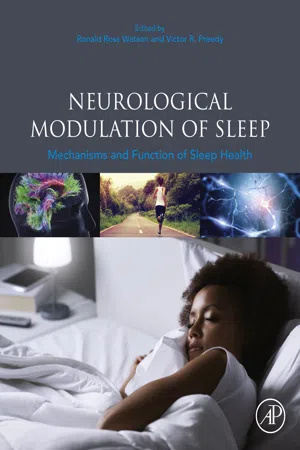
Neurological Modulation of Sleep
Mechanisms and Function of Sleep Health
- 430 pages
- English
- ePUB (mobile friendly)
- Available on iOS & Android
Neurological Modulation of Sleep
Mechanisms and Function of Sleep Health
About this book
Neurological Modulation of Sleep provides readers with updated scientific reviews regarding the interaction between sleep and contributing factors, with special attention paid to the potential for neurological modulation of sleep via diet. This book expands the notion of diet and adds an element of physical activity and exercise as well as a chapter on caffeine and its effects on sleep. With 30+ international contributors, this book aims to provide readers with a unique global perspective on the role these factors plays in sleep architecture and its regulation by circadian biology and neurology.Sleep disorders have become an increasing problem plaguing more than 70 million Americans according to the American Sleep Association. There is a clear association between sleep disorder and a wide range of other human disorders –performance deficiencies, psychiatric illnesses, heart disease, obesity and more – but in spite of this there is not yet a convenient overview on the market detailing the impact of obesity, age, diabetes and diet on sleep duration and attendant health outcomes.- Describes the impact of diet, caffeine and physical activity on sleep- Reviews the neurology and metabolism of sleep- Identifies what foods impact sleep and how- Discusses the clinical use of nutraceuticals to improve sleep
Frequently asked questions
- Essential is ideal for learners and professionals who enjoy exploring a wide range of subjects. Access the Essential Library with 800,000+ trusted titles and best-sellers across business, personal growth, and the humanities. Includes unlimited reading time and Standard Read Aloud voice.
- Complete: Perfect for advanced learners and researchers needing full, unrestricted access. Unlock 1.4M+ books across hundreds of subjects, including academic and specialized titles. The Complete Plan also includes advanced features like Premium Read Aloud and Research Assistant.
Please note we cannot support devices running on iOS 13 and Android 7 or earlier. Learn more about using the app.
Information
Physiological and Cultural Perspectives of Sleep Disorders' Impacts in Middle East Countries
Abstract
Keywords
Introduction
Prevalence of Sleep Disorders in Middle East Countries
Table of contents
- Cover image
- Title page
- Table of Contents
- Copyright
- Contributors
- Preface
- Section A. Introduction and background of sleep disruption
- Section B. Adverse effects of sleep disruption
- Section C. Dietary components and sleep
- Section D. Caffeine, alcohol and sleep
- Section E. Neuromodulation of sleep
- Section F. Vitamins, amino acids and sleep
- Index